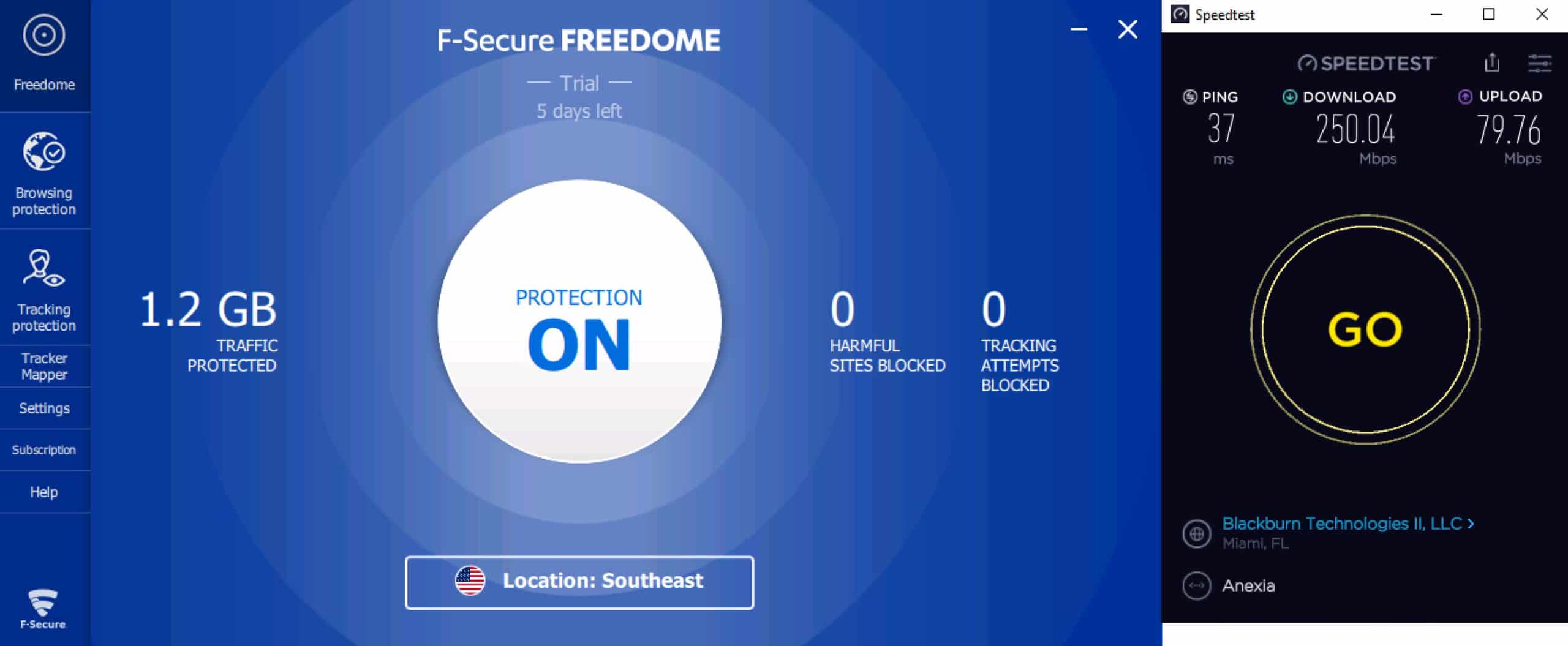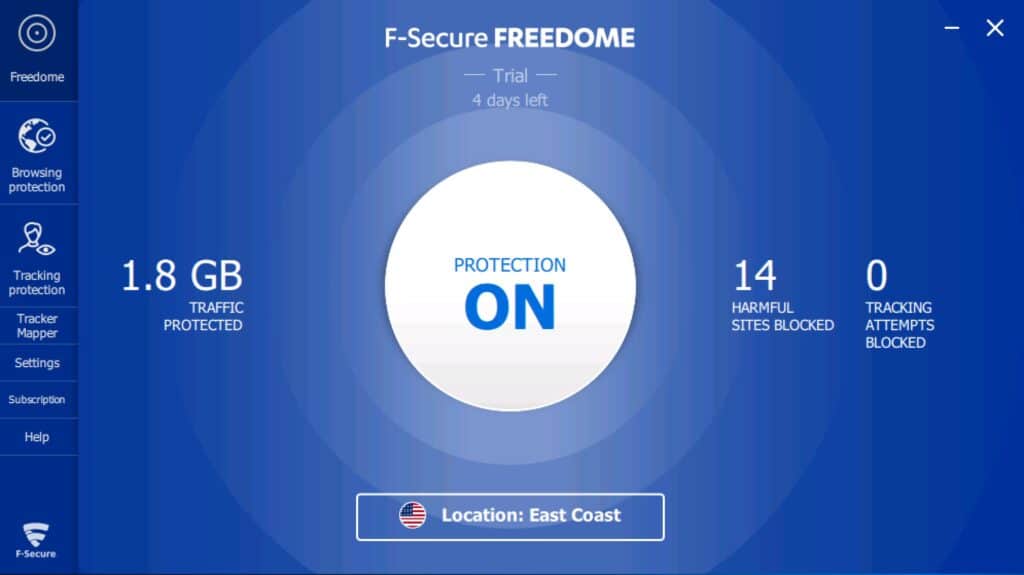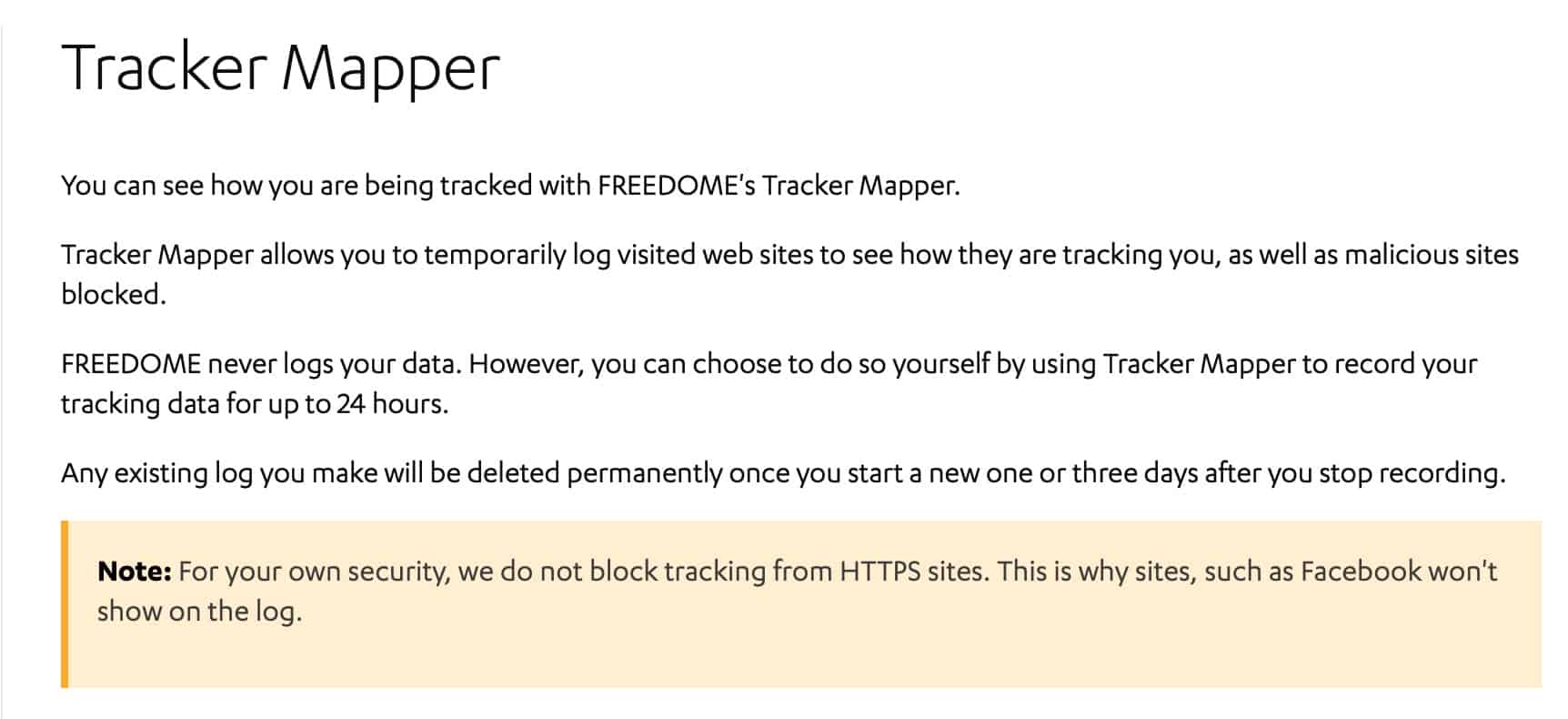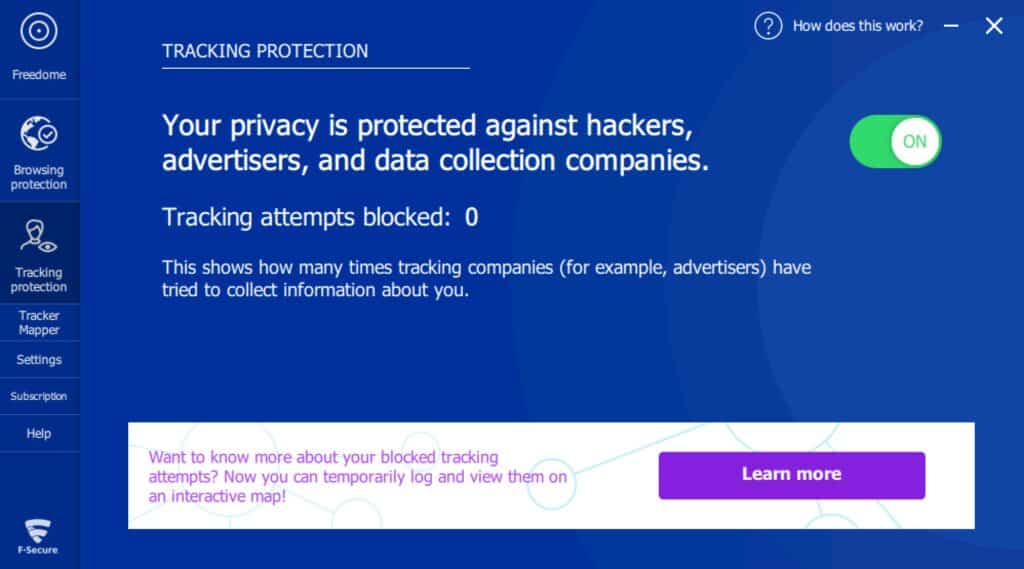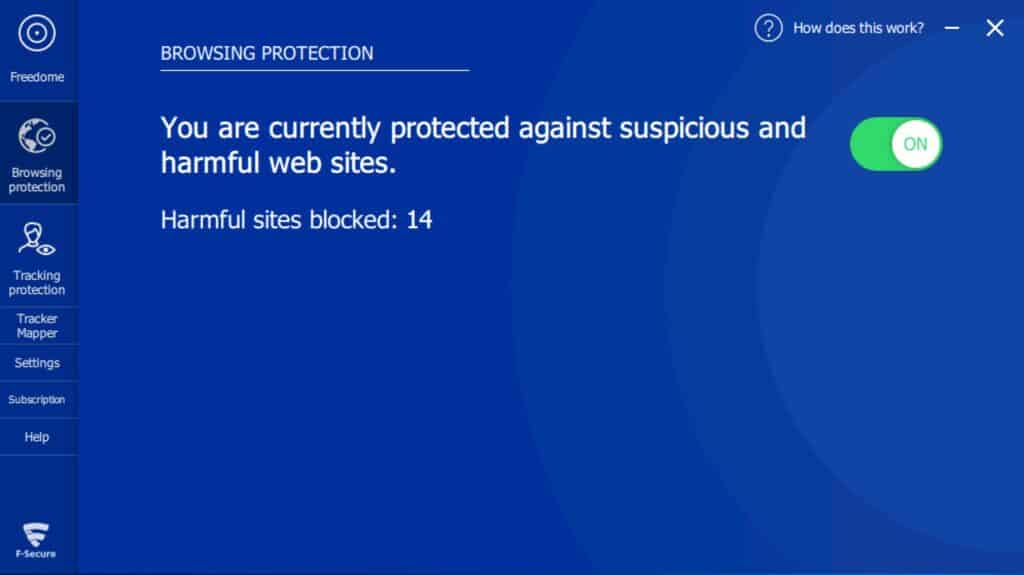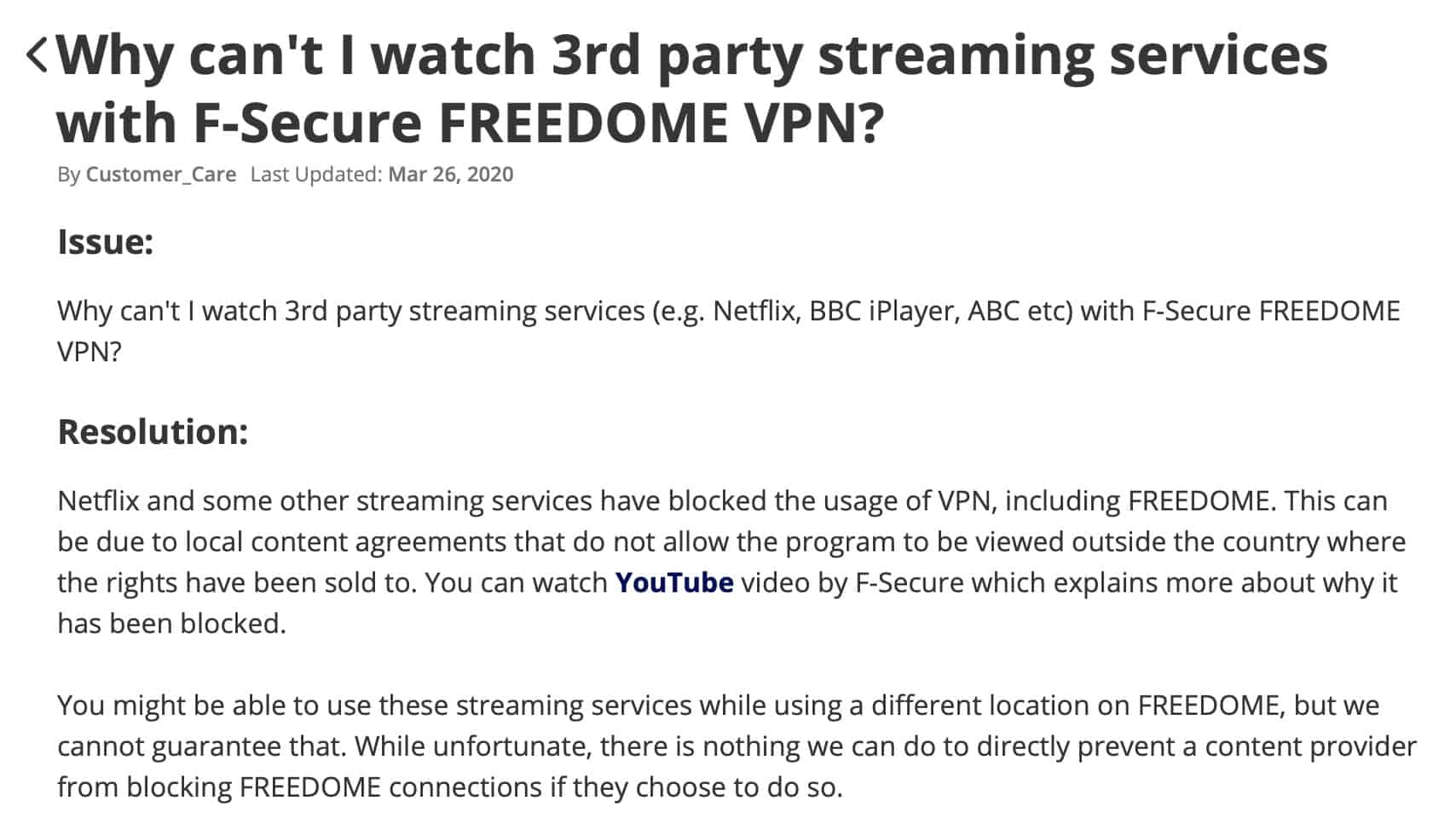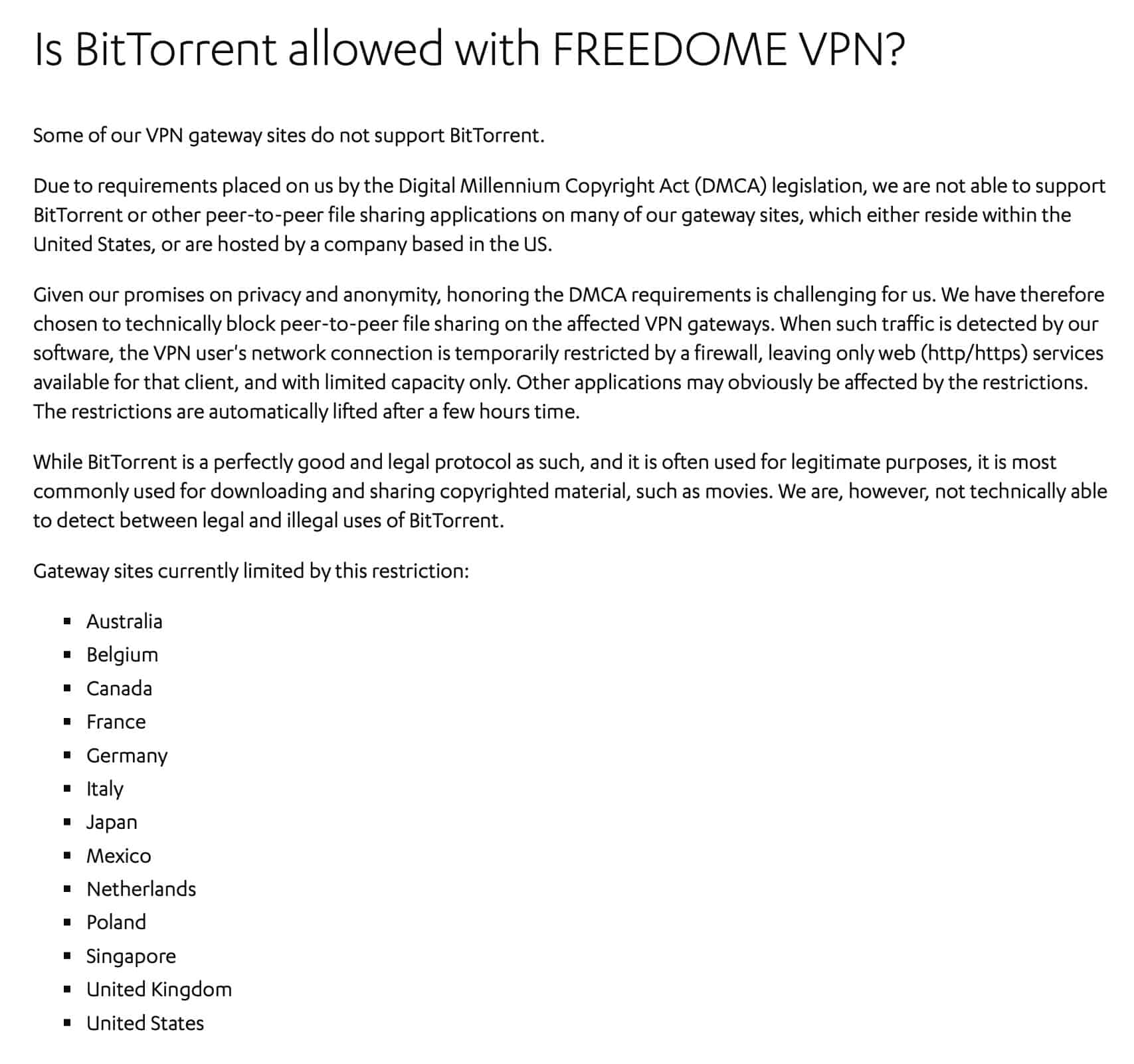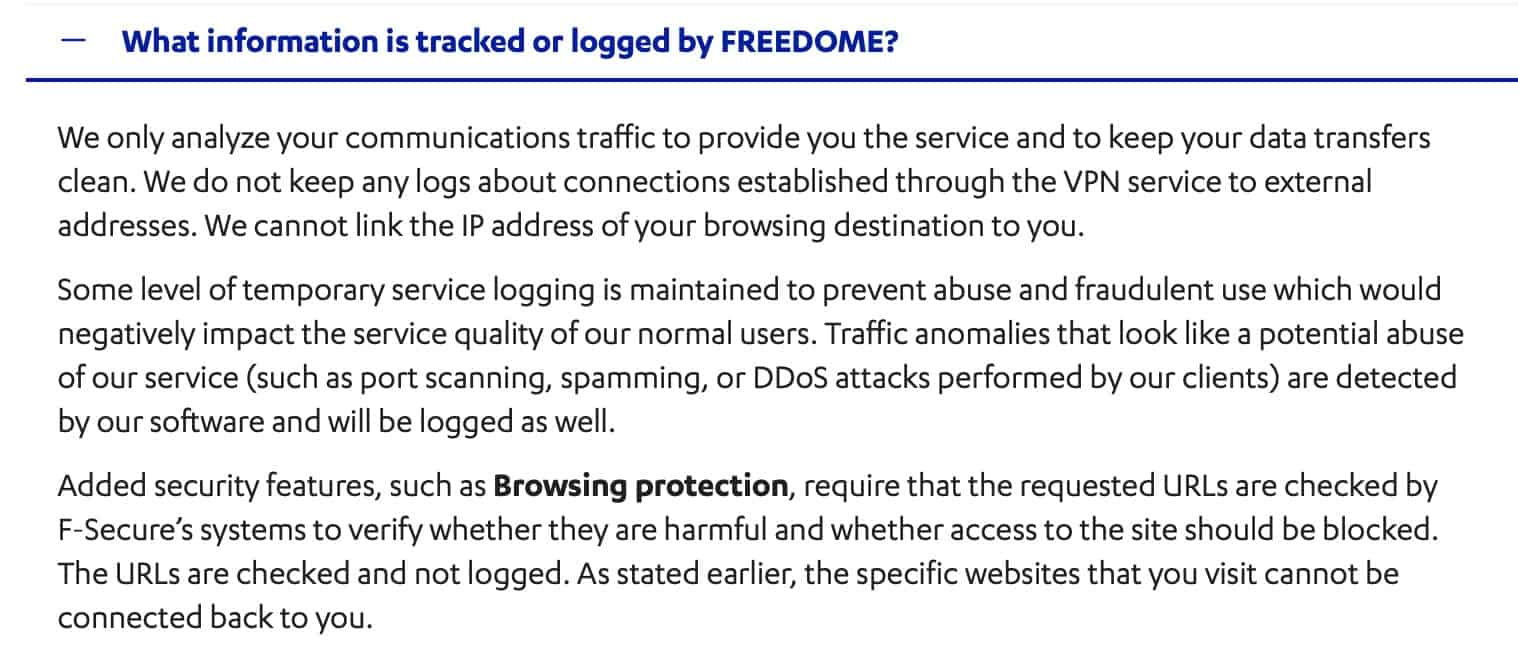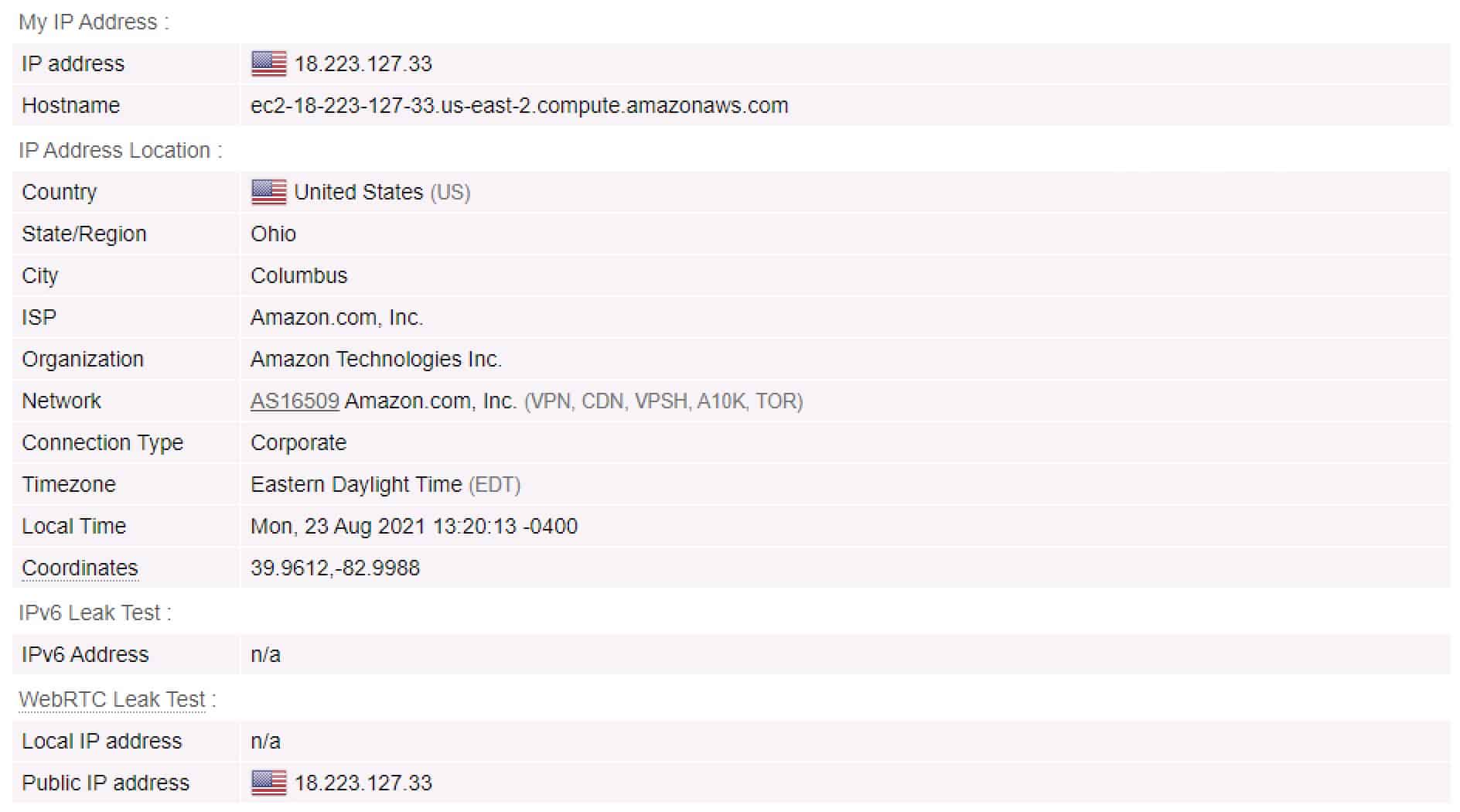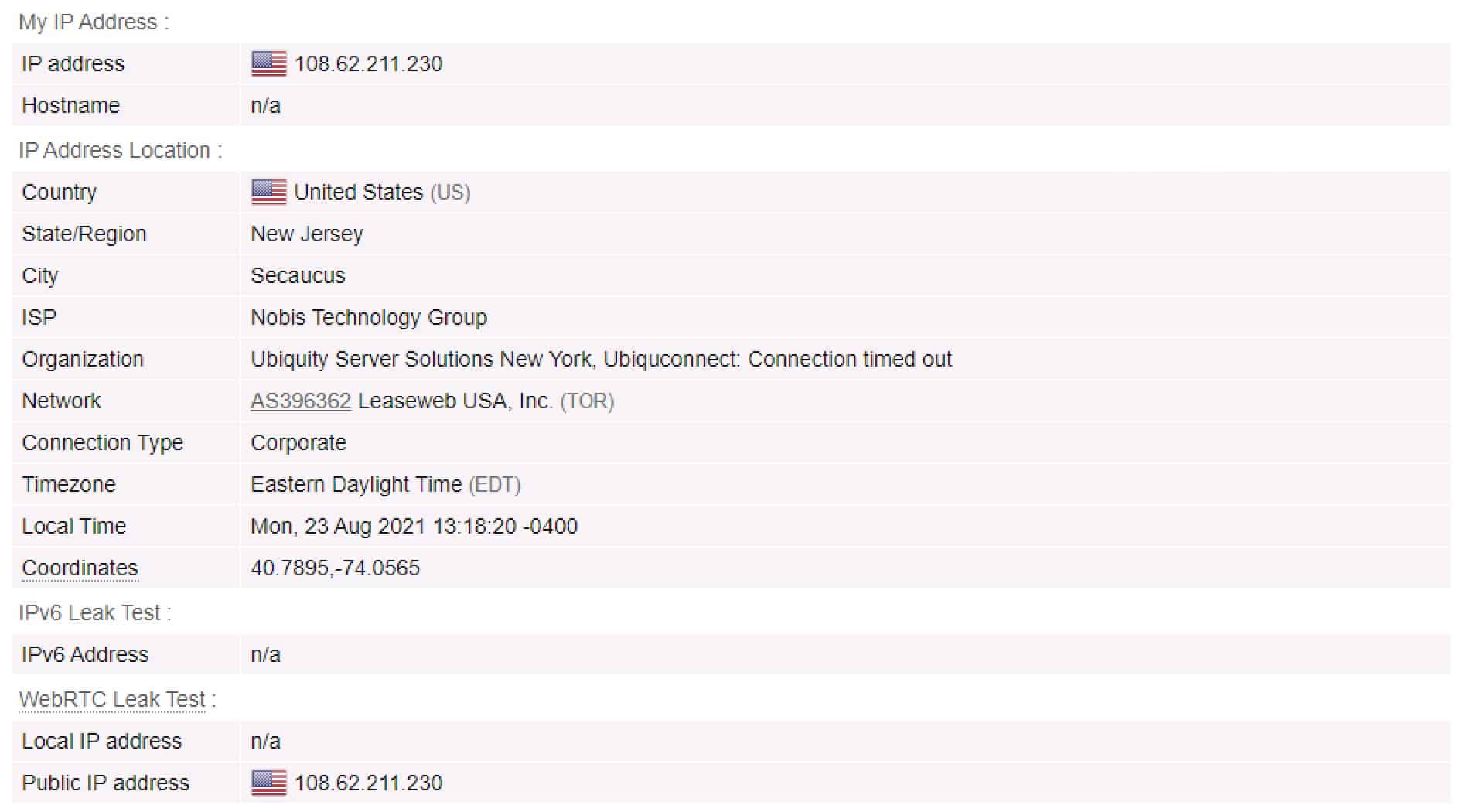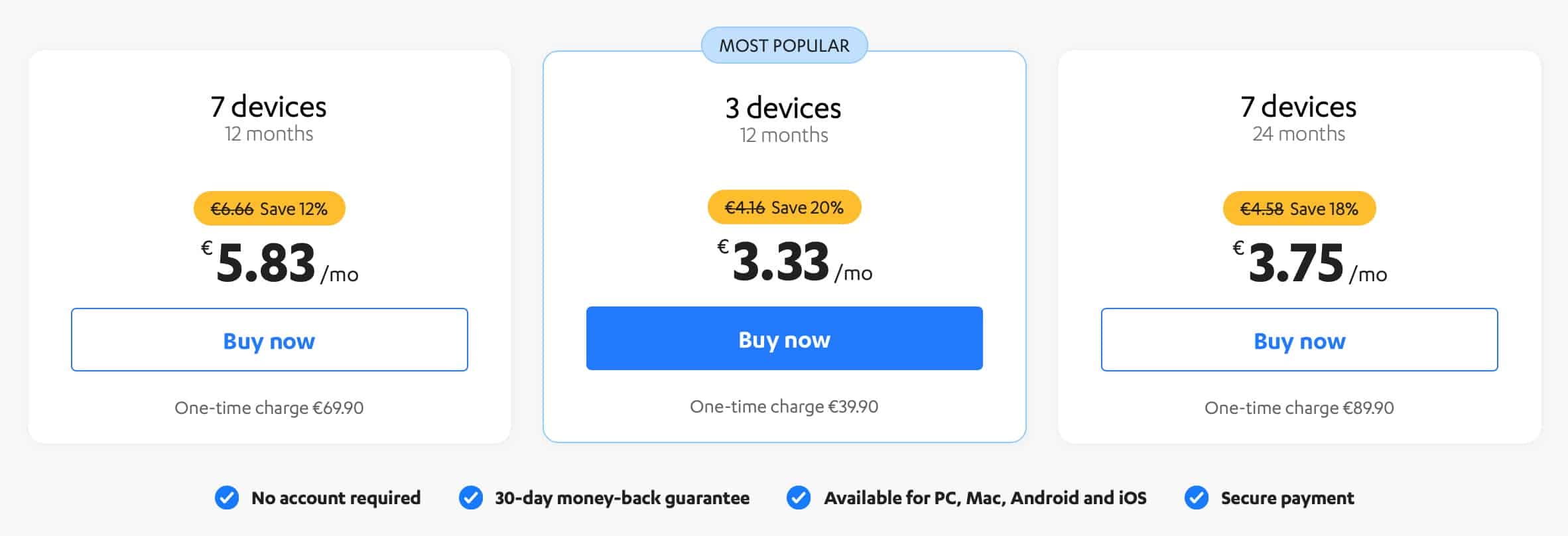
This F-Secure Freedome VPN review answers the following questions:
- How fast is F-Secure Freedome VPN?
- What are its security and privacy practices?
- How well does F-Secure Freedome VPN work with streaming sites?
- Does the service work in China?
- How good or bad is your customer service?
If you have the time and want all of the details, I recommend reading the whole thing. However, if you’re strapped for time, you can read the summary of my thoughts below.
F-Secure Freedome VPN summary
F-Secure Freedome VPN is a Finland-based VPN provider that’s more well-known for its antivirus products than its VPN service. But it’s going down that road now. While you can try the service for free, for five days, and it provides some excellent speeds, that’s where the sun stops shining.
On other important fronts, F-Secure Freedome VPN’s offering falls short. First, as you navigate its website, you’ll find plenty of marketing but not much information. And its marketing is sometimesinaccurate. It provides features that don’t seem to work, and the service doesn’t work in China, either.
Then we have the fact that despite its no-logging claims, F-Secure Freedome collects more data than most established VPN providers. It also asks for more money, which is difficult to understand. The service also doesn’t perform well on streaming sites, and its customer support isn’t great. F-Secure Freedome VPN is not recommended.
F-Secure Freedome VPN Key data
OVERALL RANK: #58 of 62 VPNs
Speed
Average Speed*:
113.2 Mbps
Video Streaming Support:
4K UHD
Streaming
Netflix:
Yes
Other Streaming Services:
Amazon Prime Video
Security
Encryption Type:
256-bit AES/128-bit AES
Kill Switch:
Yes
Log Policy:
Collects a lot of user data despite no-logging claims
Protocols:
OpenVPN, IKEv2
Value for Money
Lowest Monthly Cost:
$2.91
Money Back Guarantee:
30-day money-back guarantee
Website https:// www.f-secure.com
How does F-Secure Freedome VPN compare to other popular VPNs?
Here’s how F-Secure Freedome VPN compares to ExpressVPN and NordVPN:
No value F-Secure Freedome VPN ExpressVPN NordVPN Website f-secure.com ExpressVPN.com NordVPN.com Average Speed (Mbps) 113.2 Mbps 300 Mbps 300 Mbps OpenVPN data encryption 256-bit AES/128-bit AES 256-bit AES 256-bit AES Kill Switch Desktop only Allows Torrenting Connection logs Collects a lot of user data despite no-logging claims Some aggregated data
Unblocks Netflix US Unblocks Prime Video Unblocks Hulu
Unblocks BBC iPlayer
Lowest monthly cost $3.74 $4.99 $3.39 Money back guarantee 30 days 30 days 30 days Overall rating 2 9.3 9.7 Best deal (per month) $3.74
Save up to 58%$4.99
SAVE: 61% + 4 months free on 2 year plans$3.39
Up to 76% off 2 year plans + free Amazon Gift Card
F-Secure Freedome VPN pros and cons
Pros:
- Good speeds
- Five-day free trial
- Kill switch included
Cons:
- Uninformative website
- Confusing features
- Inaccurate marketing
- Collects a lot of user data
- Subscriptions are yearly or bi-yearly only
- It doesn’t work in China
- Poor streaming performance
- No router support
- Poor customer service
How fast is F-Secure Freedome VPN?
A VPN’s primary reason for being is to protect your digital privacy. But it needs to do so while maintaining your internet speed to a respectable level. If it bogs your connection down, it’s going to be a frustrating experience.
Speed isn’t really a problem with F-Secure Freedome. The service is fast. I run my tests over servers in North America, Asia, and Europe. As long as you connect to a server that isn’t too far away from your current physical location, you won’t feel a slowdown. Even if you connect to a faraway server, the performance is still quite good, and depending on your home internet speed, there’s an excellent chance you won’t feel it.
Globally, F-Secure Freedome’s speed averages out at 113.2 Mbps across all server locations and times tested. Here are the average speeds broken down by region:
- North America (where I am located): 228 Mbps
- Asia: 81.6 Mbps
- Europe: 30 Mbps
I ran my tests using the OpenVPN protocol over UDP. F-Secure Freedome supports OpenVPN and IKEv2 – two very secure protocols. But OpenVPN is Windows-only at this time. All other platforms only support IKEv2. We would have also liked to see WireGuard support, but we don’t even have OpenVPN support over macOS and iOS, so I’m not that surprised.
I also tested F-Secure Freedome VPN with online gaming and it was nice and smooth.
See also: Fastest VPNs
Apps & devices
F-Secure Freedome VPN supports the mainstream operating systems. They are:
So there’s no Linux support and no router support. That would have been nice, but at least F-Secure Freedome VPN is covering the basics.
The app itself is well-designed and shouldn’t intimidate greener VPN users. You access most settings from a side pane on the left side of the app. Let’s look at the more interesting options we find there.
Settings
The Settings menu allows you to configure some basic settings, such as the app’s behavior when you start your computer. It’s also where you can enable or disable notifications from the app.
Below those options is where you can select your VPN protocol . Your options are OpenVPN (UDP or TCP) and IKEv2 (IPsec). Both these protocols are deemed very secure. However, as I mentioned above, this is only available on Windows and Android. On all other platforms, the F-Secure Freedome VPN app only supports IKEv2.
You can also enable or disable the built-in kill switch, select the app’s language and allow app analytics to be sent to F-Secure Freedome VPN from here. We like that the analytics collection is off by default.
Tracker Mapper
The Tracker Mapper is disabled by default. If you enable it, it will log and display any tracking attempts and block them. However, even as I browsed the web with the feature enabled, it didn’t seem to do anything, and the ‘Blocked Tracker Count’ remained at zero. And it didn’t block any ads. It’s not marketed as an adblocker, per se, but many online ads track users, so I was surprised that they weren’t getting blocked. And because of that, there was never anything to display in the Tracker Blocker menu.
Tracking Protection
Tied to the above, this is where you enable and disable Tracking protection.
Browsing Protection
This feature actually seemed to work. And the app reported 14 malicious sites blocked. It doesn’t tell me which ones, so all I can do is take it in its word. You can enable and disable browsing protection from here.
All in all, it’s a well-designed app. But its Browsing and Tracking protection features could be better.
Router support
As I mentioned above, F-Secure Freedome VPN does not support routers (or Linux) at this time. We have an excellent opportunity for improvement here.
If you’d like more information on setting up a VPN connection on a router, check out our guide on VPN routers .
Streaming and Netflix
Many streaming services are difficult to access over VPN. Still, many VPN providers find ways to make it work. It’s not something that will work 100% of the time on every server. But many premium VPN providers manage to grant access to streaming sites over VPN most of the time – even if you may have to switch servers from time to time.
F-Secure Freedome VPN doesn’t guarantee access to streaming sites, so if you’re a heavy streamer and that streaming over VPN is very important to you, you probably want to look elsewhere for your VPN provider.
Regardless, I successfully accessed Netflix US and Amazon Prime Video , but that’s it. I wasn’t able to access Hulu , Disney+ , or BBC iPlayer . On another day, perhaps the results would be different, but it’s going to remain hit and miss with F-Secure Freedome VPN.
Have a look at our recommended VPNs for streaming .
Torrenting
Torrenting is allowed over F-Secure Freedome VPN’s network, but only on specific servers. It bars P2P file-sharing on the above servers.
These countries are more hostile to P2P file-sharing, so this makes sense to me, and it’s absolutely fine.
I tested torrenting over F-Secure Freedome VPN’s network, and it went very well. Good speeds, no freeze-ups, etc. Torrenting was fine over F-Secure Freedome VPN’s network.
But if you’re a heavy torrenter, you may prefer signing up to a VPN provider that’s less DMCA-friendly. If that’s you, check out our recommended VPNs for torrenting .
Does F-Secure Freedome VPN support split tunneling?
Yes, kind of. F-Secure Freedome VPN’s Android app can whitelist apps that bypass the VPN and make a direct connection to the internet from your device. It’s too bad that this feature is reserved for Android devices as it’s quickly becoming a staple feature for VPN providers. We hope to see F-Secure Freedome VPN bring the feature to more platforms going forward.
If split tunneling is critical to you, have a look at our recommended VPN for split tunneling .
Security, privacy, and logging
When trying to assess a VPN provider’s service, you can’ just look at its marketing and call it a day. I mean, every VPN provider out there will claim to be secure and private. But not all of them are. So it’s crucial to look through its privacy policy, FAQ, and knowledge base if provided.
Looking through F-Secure Freedome VPN’s FAQ, we found the following:
So while it claims not to log your VPN traffic, it does state that it performs traffic analysis to detect abuse patterns, which is a pretty vague statement. It then states that if you turn on its Browsing Protection feature, by necessity, it needs to check the URLs – which is understandable – but it won’t log them. While I’m not a fan of its traffic analysis, this isn’t so bad so far.
Moving on to its privacy policy, we find this:
And it’s a bit confusing. F-Secure Freedome starts by stating that it doesn’t “seek to spy on the exact content of your private communications.” So just the ‘general content’ – whatever that is?
It then goes on to state that it collects:
- Your original IP address
- A random ID generated by F-Secure Freedome and assigned to you
- Timestamps
- Your origin IP address’ country code
- Other technical device data
And then, it goes on to restore its traffic analysis practices. I don’t know about you, but that’s a lot of data in my book.
Moving on to protocols and encryption , F-Secure Freedome supports IKEv2 and OpenVPN – two very secure VPN protocols. However, OpenVPN is only available on Windows and Android. All other platforms (iOS, macOS) use IKEv2. It’s not a huge issue as IKEv2 is very secure. But we’d like to see OpenVPN and/or Wireguard supported across all platforms.
Regarding encryption, F-Secure Freedome VPN uses AES-128-GCM for OpenVPN and AES-256-GCM for IKEv2. Part of the reason for its speed may be down to its use of 128-bit encryption over OpenVPN (128-bit AES is still considered very secure).
There also seems to be some confusion over which platforms support which VPN protocols. F-Secure Freedome VPN’s marketing is all over the place. And its Support section tells us that it stopped supporting OpenVPN at one point. Whatever the case, it’s back. But only on Windows and Android, not on macOS or iOS. So it should clean its marketing up.
As far as IP and DNS leaks are concerned, I was happy to see that F-Secure Freedome VPN wasn’t vulnerable to either leak.
IP Test – Without VPN
IP Test – With VPN
DNS Test – Without VPN
DNS Test – With VPN
Servers
F-Secure Freedome VPN’s network consists of servers in 22 countries. However, it does not disclose the number of servers available in each location, so I can’t really say how big its network is. But I would bet on it being one of the smaller networks in the VPN space – and that’s absolutely fine. Twenty-two countries is a pretty good selection. And, as you may know, I prefer smaller networks because it gives me the impression (yes, just an impression) that more care goes into the configuration of each server.
Here is the list of countries in which F-Secure Freedome VPN has servers:
- Australia
- Austria
- Belgium
- Canada (Montreal, Toronto, and Vancouver)
- Czech Republic
- Denmark
- Finland
- France
- Germany
- Ireland
- Italy
- Japan
- Mexico
- Netherlands
- Norway
- Poland
- Singapore
- Spain
- Sweden
- Switzerland
- United Kingdom
- USA (East Coast, Northwest, South, Southeast, and West Coast)
That’s more than enough, in my book.
Does F-Secure Freedome VPN work in China?
No, it doesn’t. And that’s one thing that F-Secure Freedome VPN makes clear.
We can’t knock the service because it doesn’t work in China. China actively blocks VPNs that aren’t approved by the state. Getting around the Great Firewall of China isn’t trivial and requires some obfuscation methods to be in place. And even then, there may be some trial and error to get it to work in terms of server selection.
I appreciate the fact that F-Secure Freedome VPN is transparent about it not working in China.
If connecting from China is a requirement for you, check out our in-depth article on which VPN providers actually work in China .
How is F-Secure Freedome VPN’s customer service?
I’m afraid it’s pretty bad. Support with F-Secure Freedome VPN comes either in the form of telephone support or through its online chat. I chose the latter and asked which platform supported which VPN protocol. And the rep couldn’t answer my question. The conversation was too long to post here.
F-Secure’s rep didn’t understand that I was talking about its VPN offering and kept asking me unrelated questions. I finally spelled it out for them: I wanted to know which VPN protocol (OpenVPN, IKEv2) is supported by which platform (macOS, Windows, iOS, Android). They finally understood and then just fed me back what’s written in its inaccurate marketing… Not great.
F-Secure Freedome VPN pricing
F-Secure Freedome VPN offers six different subscriptions, although it only prominently advertises three of those.
12 months
- Up to three devices: $34.99 – comes to approximately $2.91
- Up to five devices: $39.99 – comes to roughly $3.33
- Up to seven devices: $69.99 – comes to approximately $5.83
24 months
- Up to three devices: $59.99 – comes to approximately $5.00
- Up to five devices: $69.99 – comes to roughly $5.83
- Up to seven devices: $89.99 – comes to approximately $7.50
F-Secure Freedome VPN also provides a 5-day, unlimited, no credit card required, free trial, which is nice.
It seems to me that if you’re a minor player in the VPN space, you might want to provide monthly prices. Not many people will want to commit to 12 or 24 months with a VPN provider they don’t know very well, and that doesn’t have an established reputation in the market.
On top of that, allowing only three simultaneous connections seems a bit stingy. Most VPN providers allow up to five or more – without charging a premium.
Aside from that, all subscriptions come with a 30-day money-back guarantee, which is nice.
Do I recommend F-Secure Freedome VPN?
I can’t, in good faith, recommend F-Secure Freedome VPN. But that’s not to say that its offering has nothing good. It does. But the negatives win over the positives. Let’s go over these quickly.
So, let’s start with the good. F-Secure Freedome VPN provides excellent speeds – especially when connected to a nearby server. And… Well, that’s it, really. I mean, it does an OK job at streaming, but you can easily find a VPN provider that will unblock more sites, and that will very likely cost less too.
And while I kind of like its app design, some of its features (Browsing Protection and Tracking Protection) are confusing at best. And although one would expect to see fewer ads while browsing with these features turned on, they seemed to have no effect whatsoever.
As for its privacy policy, while it claims not to log your traffic, it still collects an impressive amount of user data, as well as performing traffic analysis on its users. Not exactly what you want from a VPN provider.
And, last but not least, its subscriptions are for a minimum of one year, which, again, is a big ask for such a small VPN provider, and its prices are higher than most of the competition. I’m afraid there’s no way around the fact I can’t recommend F-Secure Freedome VPN.
Any one of the VPN providers listed below will serve you better.
F-Secure Freedome VPN alternatives
NordVPN
NordVPN is a very well-known Panama-based VPN provider. It offers a large number of features for security, privacy, and convenience. Ad-blocking, DNS leak protection, robust encryption, and VPN kill switch will serve you on the security front. A strict no-logging policy, a strict privacy policy, and support for anonymous payments have you covered for privacy. Dedicated P2P servers, native apps for every major platform, and up to six simultaneous connections (or more with a VPN router) make NordVPN a very user-friendly service.
Surfshark
Surfshark supports secure VPN protocols and performs exceptionally well on most streaming sites. It adheres to a strict no-logging policy, and the service also works in China. On top of that, Surfshark allows an unlimited number of simultaneous connections. It also recently updated all of its servers to run from RAM. Worth checking out.
ExpressVPN
ExpressVPN is one of the most prominent players in the commercial VPN market and benefits from an excellent reputation. Its privacy and security practices are outstanding. All of its VPN servers run from volatile memory (RAM) and are booted from read-only disks. This setup pretty much guarantees that no remnant data (logs) can exist on the system’s hard drives, which is a boon for user privacy. ExpressVPN may be a little more expensive than most providers out there, but it’s fast, secure, unblocks streaming sites, and works in China.
Methodology used for testing
Below you’ll find the criteria used to assess the VPNs we review. It’s essential to be consistent across the board so that our reviews are reasonably objective and that we’re not comparing apples to oranges. For that reason, we want to publicize our criteria.
- Speed - Speed will always be one of the most critical factors for any VPN. Aside from being frustrating, slow speeds can prevent you from streaming or even browsing the web. We provide that all of our recommended VPNs scored very high in our most recent speed tests to ensure this issue is addressed.
- Apps & ease of use – VPNs today are more popular than ever and are used for more varied reasons than ever, as well. So app design and its ease-of-use is critical. We look at the client apps’ UI, the features they provide, the supported operating systems, and their complexity.
- Streaming services – Accessing streaming sites over VPN is becoming rather complicated. But many VPN providers claim to work with streaming sites – with varying degrees of success. Before recommending a VPN provider for streaming, we test them against a range of popular streaming services, including Netflix, Amazon Prime Video, BBC iPlayer, HBO Max, Disney+, Hulu, and more.
- Torrenting – Many P2P file-sharers are also avid VPN users. But some VPN providers disallow torrenting over their network, while others go as far as providing dedicated P2P servers. We look at each VPN’s policy around torrenting and run tests on those to see how well they handle file-sharing.
- Security & privacy – This is pretty much a VPN’s reason for being. We ask the critical questions, like: What is the provider’s privacy policy like? What is its logging policy? What encryption protocols does the VPN support? Does it use secure ciphers? Is Perfect Forward Secrecy (PFS) supported? Is it vulnerable to IP or DNS leaks? These are all crucial questions, and we provide answers to all of them when assessing VPNs’ privacy and security practices.
The above represents a high-level view of our methodology. If you’d like more details, have a look at our full VPN testing methodology . This data-driven approach helps us better understand the services to recommend the right VPN to the right users.

